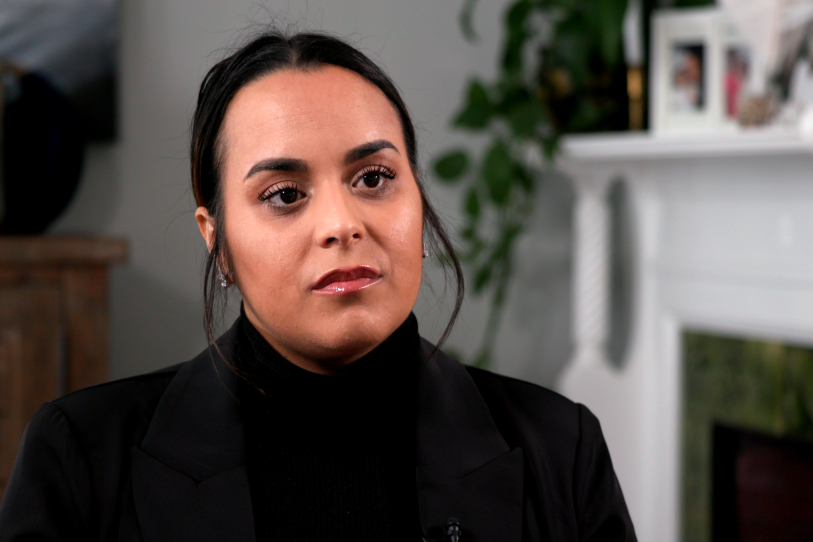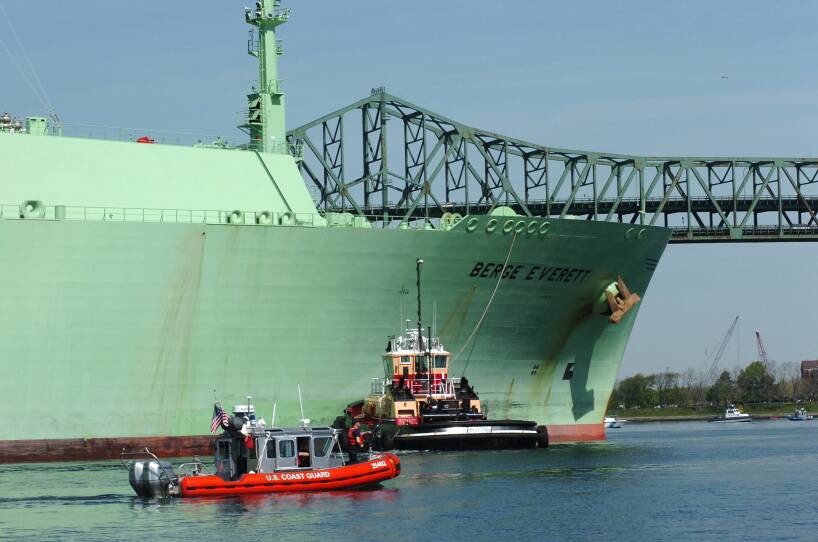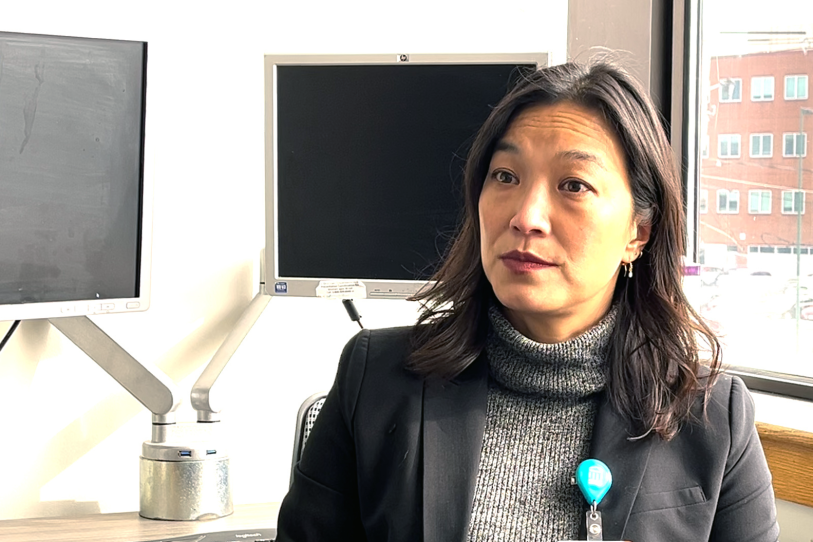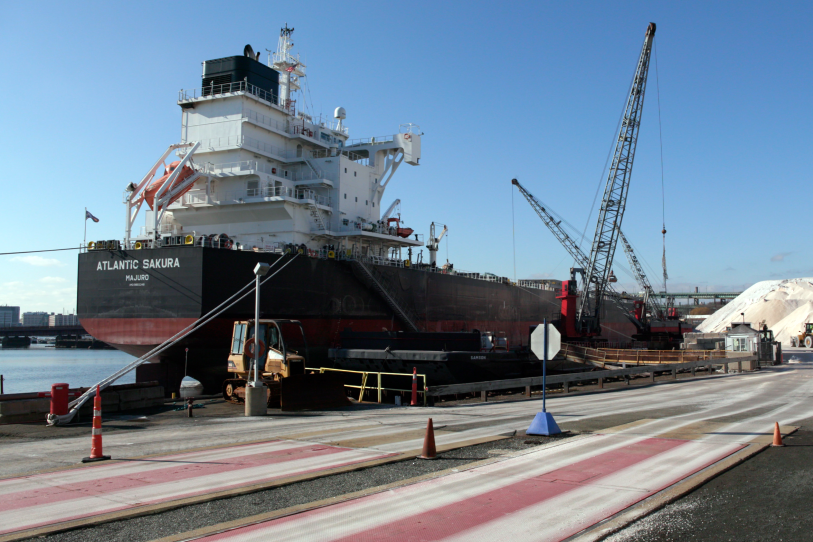On a recent wintery day, a massive cargo ship arrived to Massachusetts. Trailed by the stench of diesel exhaust and visible plumes of dark smoke, it was carrying rock salt from Chile.
Two tugboats guided the ship along. A drawbridge that connects East Boston and Chelsea opened for 21 minutes, idling the dozens or hundreds of trucks and cars waiting to cross.
Once the 43,000-ton ship was at berth, it stayed there for nearly three days — engine running — as cranes and bulldozers unloaded its cargo.
The Liberian-flagged ship is one of an increasing number of massive oceangoing vessels — some of them longer than three football fields — that arrive to and depart from Boston Harbor, from South Boston up to Chelsea, Everett and Revere.
WATCH: Reporter Chris Burrell and Chelsea City Councilor Melinda Vega on Greater Boston
The ships, barges and tugboats play a colossal economic role in the New England region, bringing in jobs and goods from around the world — shiny new vehicles, appliances, flat-screen TVs and sneakers but also fuel that heats homes and powers cars, trucks. Last week’s stunning collapse of a Baltimore bridge — following a collision with a massive cargo ship — has prompted national questions about the dangers of huge vessels in local ports.
But a growing number of scientists, health experts and activists say there’s another overlooked cost of the region’s massive shipping industry: significantly poorer health from exposure to air pollution for the tens of thousands of children and adults living near ports, disproportionately impacting lower-income communities of color. They say pleas to limit expansion or curb emissions have been largely brushed aside.
Among those concerned about their health is 35-year-old Melinda Vega who lives in Chelsea, just north of Boston, one of the state’s most densely populated communities and home to mostly Hispanic residents. Vega has asthma and says her two young sons suffer from severe respiratory diseases that have made them too sick to attend school and sent one of them many times to the hospital gasping for breath. Vega says their health has worsened over the last two years.

“We don’t smoke in this house. And the only other factor that I can put [it on] is we live here, and our air quality is extremely poor,” said Vega, who is a Chelsea native and city councilor. “How difficult it’s been — waking up at night and him visibly not being able to breathe,” Vega said about her 9-year-old son, Armani.
While individual cases are difficult to tie to any single factor, the overall data paints a clearer picture. Fine diesel particulate matter is unusually concentrated in Chelsea, ranking in the 95th percentile in the state, according to EPA data. And, in contrast to falling asthma rates across the state over the last decade, children in Chelsea have experienced an opposite and troubling trend.
Massport, a quasi-governmental agency that owns three maritime ports in Boston and handles by far the most tonnage in the harbor, says the ports are critical to the local economy, providing thousands of jobs, and that it is trying to mitigate environmental impacts. And if the goods didn’t come into their ports, they say, they’d simply arrive from elsewhere.
“We are continuing to work with our stakeholders. customers, and tenants to reduce their emissions,” Massport told GBH News in a written statement. “The Port of Boston generates more than $8B in economic impact. Keeping this business in Boston reduces emissions from thousands of trucks that would otherwise use the ports of New York/ New Jersey.”
But community activists and health experts say more could be done to reduce pollution.
A growing maritime industry
At a February board meeting, Massport leaders said that 149 cruise ships would arrive at its Flynn Cruiseport pier in South Boston in 2024, a 16% increase over last year. They also celebrated the arrival of the largest-ever container ship to Boston, the 1,204-foot long Thalassa Doxa.
“We’ve got a very strong February forecast that would bump those results to more than 14,000 containers moved,” said Joseph Morris, port director, in a meeting recorded by GBH News.
Ship tonnage — referring to the size and weight of vessels chugging to harbor ports — exceeded pre-pandemic levels for the first time in 2023, according to U.S. Customs data obtained by the GBH News Center for Investigative Reporting. It rose about 25% over 2022 to 21.2 million tons.
Massport handled more than three-fourths of the ship tonnage coming to Boston last year, that data shows.
And it is expanding. Massport spent some $382 million of its own funds and $182 million in state grants in recent years to deepen the harbor and modernize the Conley Container Terminal in South Boston where container ships from around the world are offloaded and some onloaded for exports. It operates a second port in South Boston for cruise ships, and a third in Charlestown for ships delivering imported vehicles.
Advocates and experts want to see Massport track its emissions, limit expansion, and make changes that would curb the amount of diesel being burned at the ports, like building the infrastructure for ships to connect to electric power on land so that they aren’t spewing exhaust while they’re unloading.
South Boston environmental activists Frances (Lucky) Devlin and Mary Cooney say they tried to fight Massport’s efforts in 2016 to expand the Conley terminal, citing concerns about health impacts on the densely settled neighborhood a block away. They say they couldn’t even persuade state officials to study the environmental consequences of the project.
“We asked when will we see an environmental impact study of these larger ships coming into the port. And it was deaf ears,” Cooney told GBH News. “There’s just no accountability.”
Massport’s decision in 2016 to expand its container ship terminal in South Boston drew little scrutiny from the state’s top environmental agency. Then-Secretary of Energy and Environmental Affairs Matthew Beaton determined the project “does not require an Environmental Impact Report.”
Agency leaders say they are working to reduce pollution, pointing to the construction of a dedicated freight corridor in South Boston to get trucks off residential streets, recent upgrades of cleaner-burning diesel engines on more than 60 trucks at Conley that help unload and move cargo from ships, and local parks it has created to offset the environmental impact.
But when activists and local politicians pushed for electrified shore power at Conley — enabling ships to turn off their engines at port — Massport responded with a 2016 study, concluding that would be too costly and overtax the electric grid.
Massport says it is now reconsidering shore power for its cruise ship terminal, as the global cruise industry moves in this direction.
Ken Gillingham, a professor of environmental and energy economics at Yale University, told GBH News that officials should pay attention because increased shipping is directly linked to worse health outcomes like heart disease and respiratory illnesses in frontline communities. He recently co-authored a study highlighting the connection, as well as the racial disparities of those harmed.
At GBH News’ request, he took a closer look at what’s happening in Boston Harbor. Using formulae from his study, Gillingham estimates the rise of shipping traffic in Boston Harbor last year likely caused an 8% increase of major air pollutant concentrations in frontline communities, impacting as far as 25 miles from the ports.
“You really have a lot more pollution from both the ships themselves and all the activities associated with the ships,” he said. “That directly leads to further hospitalizations right away.”
Health consequences
Environmental activists say the ships spewing diesel exhaust across their port neighborhoods pose one more burden — one that’s not yet quantified — atop many economic and environmental hardships.
Chelsea has been called the “boiler room” of the regional economy and transit grid. Together, East Boston and Chelsea host Logan International Airport, the Tobin Bridge, three tunnels, and industries that generate heavy truck traffic: scrap-metal yards, a regional hub for fresh produce, and a road-salt business supplying the state and local public works departments.
One reason that the shipping industry is historically under-examined is that it’s largely out of sight. The ships and waterfront industries are set down low, largely unseen behind barriers and industrial buildings.
But it’s not hidden from people like Mary Corso, a longtime resident of East Boston who kayaks in warmer months.
“That’s how I know about the smell of all the diesel fuel from the ships — and from the tugboats, especially,” Corso told GBH News recently. “I was behind a couple tugboats one time, and it’s like, ‘Holy crap.’ I had to get away from it. Seriously, I was thinking all these people that are around here, they have windows open and that stuff is going into their houses.”
A fifth of Chelsea residents live below the poverty line. And both communities also have large immigrant populations whose fear or language abilities can impede access to health care.
Celeste Ribeiro Hewitt, an environmental activist in East Boston whose focus is largely on the pollution from Logan, says shipping pollution adds to an already overwhelming problem.
“We’re already battling all this other stuff and trying to keep it under control,” Ribeiro Hewitt said. “Shipping is the last thing that we need.”

Recent federal studies have linked shipping with premature deaths, cancer and other diseases in port communities.
One reason ships’ exhaust has such a profound health impact is because of the fuel they burn. “Road diesel” — the diesel that powers some cars and trucks — is more tightly regulated. But ships’ “bunker fuel” contains levels of sulfur more than 60 times higher than limits placed on diesel vehicles in the United States, according to the International Council on Clean Transportation.
There’s no hard data to show what portion of air pollution in Chelsea, or in other port communities, comes from the growing maritime shipping industry.
Scott Hersey, who teaches at Olin College of Engineering in Needham and specializes in environmental justice research, says a single sensor that he installed in East Boston’s Jeffries Point — meant to track air quality near Logan Airport — is already picking up high levels of emissions from across the harbor at Massport’s South Boston ports.
“The signal we saw from the direction of shipping was as big, if not bigger than, the signal from Logan, which is just right there in the community,” he said. “It seems like it’s significant.”
Massport says it plans to complete its first-ever inventory of emissions at the ports this year, information it says it will use to assess its role in hazardous emissions.
But some say the decision should have occurred years ago. Local authorities at more than a dozen other ports in the United States already conduct emissions inventories, according to the EPA.
Advocates see the health consequences of the “boiler room” in Chelsea and East Boston clearly in emergency rooms.
For decades, kayaker Corso, 66, and her 74-year-old husband lived near the Chelsea River. Her husband now suffers from chronic pulmonary obstructive disease.
Older adults living in Chelsea went to the ER for COPD at roughly double the statewide average in 2019, and significantly more often in Everett, too, according to the Massachusetts Environmental Public Health Tracking database.
And the impacts are felt by kids, too — children who, like Vega’s sons, suffer from asthma. Children under the age of 15 in Chelsea are more likely to go to the emergency room for asthma than the statewide average, state data shows, a difference that’s gotten worse over the years.

Dr. Wynne Armand, a physician at MGH-Chelsea and an associate director at Mass General’s Center for the Environment and Health, said the adverse effects from pollution experienced in Chelsea start early and extend to old age.
“Starting from pregnancy, air pollution is associated with preterm labor and small-for-gestational age,” she said. “There’s an association of lower IQ in cities that have worse air pollution.”
Ripple effects
Maritime air pollution is not coming just from the ships themselves, health advocates said, but from ripple effects — such as local drawbridges that rise for ship traffic causing massive traffic back-ups, and a cargo offloading process that is nearly all powered by diesel equipment.
The McArdle Bridge is one of two bridges that must lift up to allow oceangoing vessels and tugboats to access ports along the Chelsea River, from East Boston to Revere. That bridge last year lifted more than 200 times a month, according to the city of Boston. For the 15 to 20 minutes it takes ships to clear the bridge each time, dozens — if not hundreds — of vehicles idle their engines.
Upriver, the Chelsea Street Bridge lifted for ships last year 1,524 times — with wait times as long as 30 minutes, according to the Massachusetts Department of Transportation.
Many of those vehicles are trucks. Karl Allen, a senior planner in Chelsea planning and economic development office, says the city failed to convince port operators in 2021 to restrict ship traffic and bridge openings during rush hour to reduce air pollution and waiting times.
“This is an industrial freight corridor, so a lot of the traffic is very large diesel trucks that are sitting there waiting for the queue to clear so they can get over to the Eastie side,” he said. “Port operators were very much against anything that would not give maritime traffic absolute priority above everyone else.”
In 2021 letters reviewed by GBH News, port operators argued restricting the drawbridge openings would hurt the state’s economy, jack up gasoline and home fuel prices, and cause “routine shortages” of petroleum products.
Offloading goods from ships is a diesel-intensive process that can last days.
“You may not be able to change the whole system because it is an economic driver. But there are smaller-scale wins that are possible.”Scott Hersey, who specializes in environmental justice research at Olin College of Engineering
In the first week of January, cranes and bulldozers at Eastern Minerals in Chelsea worked more than three days to empty salt meant for de-icing roads from a 43,000-ton cargo ship, the Atlantic Sakura that had sailed in from Chile.
Trucks rolled in and out of the yard as front-end loaders scooped up and deposited road salt. Every engaged engine belched diesel exhaust, filling the air with smoke. Crane operators only paused their work when the tide receded, making it impossible for their machine’s huge metal claws to reach inside the ship’s holds for salt.
Ships also continue to idle in port, using their diesel engines to power generators for the ships’ electricity.
Roseann Bongiovanni, executive director of the nonprofit Green Roots, an environmental justice organization in Chelsea, says pollution is non-stop.
“Those ships are coming into and out of the Chelsea Creek all day and night. It’s not like an 18-wheeler truck that could turn off the engine,” she said. “You can just see the billowing clouds of dark smoke.”
Bongiovanni said Green Roots considered fighting the shipping industry more than a decade ago but ran up against too many hurdles — including opposition from the many privately owned ports along the Chelsea River and Everett waterfronts and lack of accountability from owners of internationally owned ships.

Other activists and researchers say there is ample room for reform, especially with more than $8 billion in new funding put out in federal infrastructure legislation aimed at electrifying and decarbonizing America’s ports.
“You may not be able to change the whole system because it is an economic driver,” Hersey, the environmental justice researcher, said. “But there are smaller-scale wins that are possible, like requiring that ships [at berth] switch to ground-based power.”
Melinda Vega worries pollution is getting worse in Chelsea. Over the last two years, her children are using their inhalers more than ever. She says one son’s health got so bad a few months ago that a school nurse asked her to pick him up because even the inhaler wasn’t helping him breathe.
“Around that time, my son was out [of school] more than he was going to school,” she said.
Vega’s mother, Gladys Vega, is the executive director of La Colaborativa in Chelsea, a social services nonprofit focused on economic sustainability and housing. Gladys says community activists need to apply more pressure on policymakers to demand cleaner air from the shipping industry and to tap federal funds.
“For decades, we’ve been a dumping ground of environmental injustice. All these ship containers go by and the bridges continue to go up,” she said. “We have to be better at knowing that it’s harming our daily lives, that we’re all getting respiratory diseases or heart conditions, that asthma rates continue to grow.”








